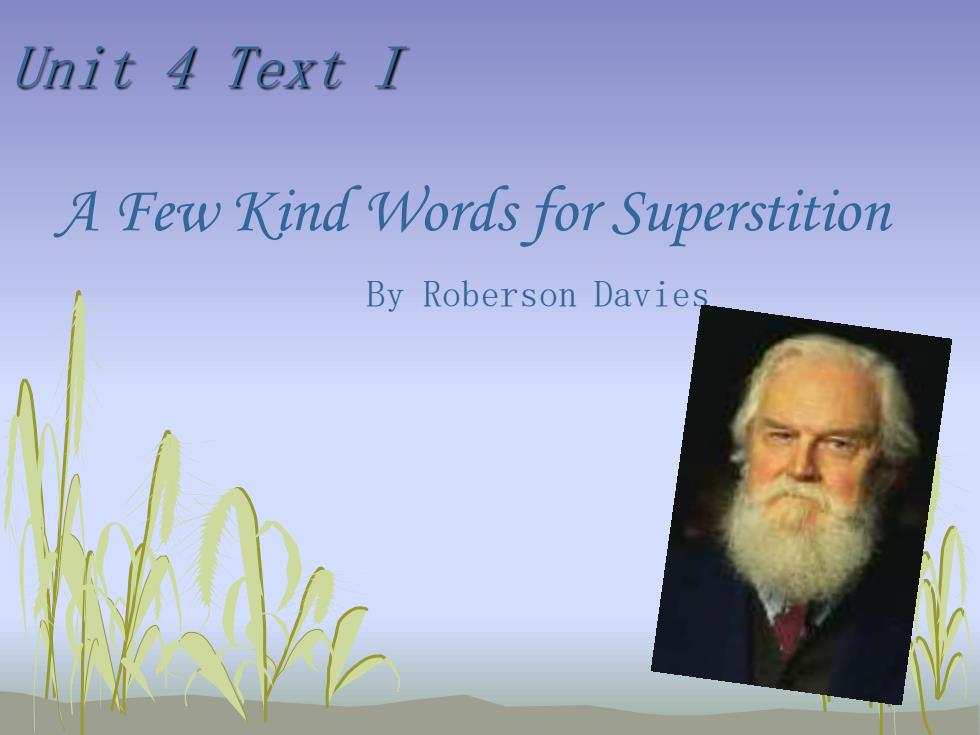
Unit 4 Text I A Few Kind Words for Superstition By Roberson Davies
Unit 4 Text I A Few Kind Words for Superstition By Roberson Davies
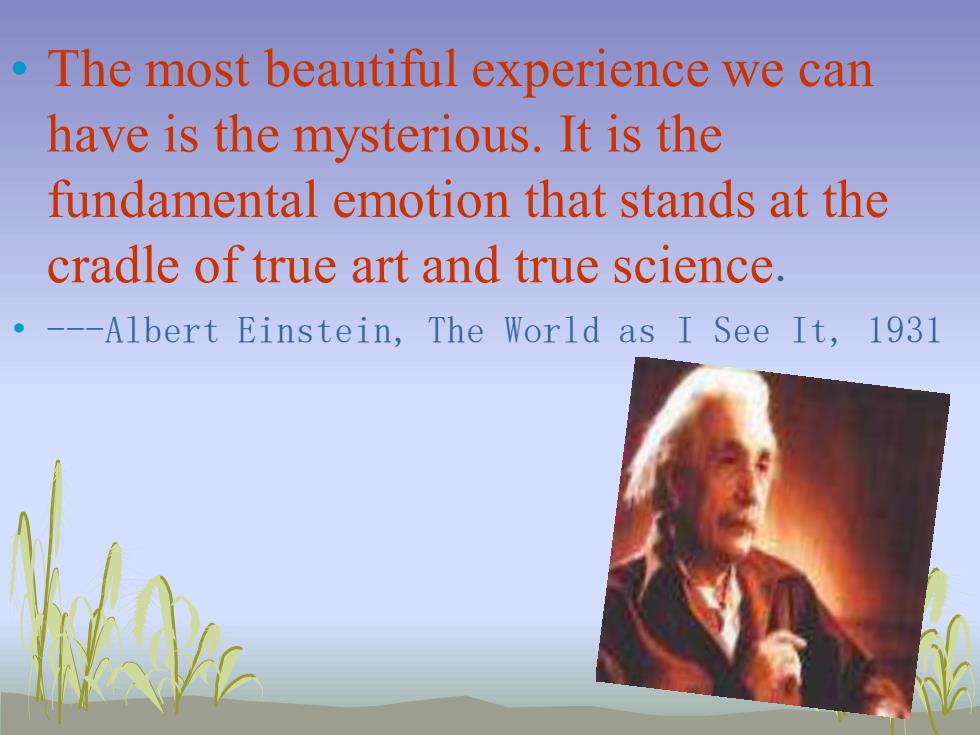
The most beautiful experience we can have is the mysterious.It is the fundamental emotion that stands at the cradle of true art and true science. -Albert Einstein,The World as I See It,1931
• The most beautiful experience we can have is the mysterious. It is the fundamental emotion that stands at the cradle of true art and true science. • -Albert Einstein, The World as I See It, 1931
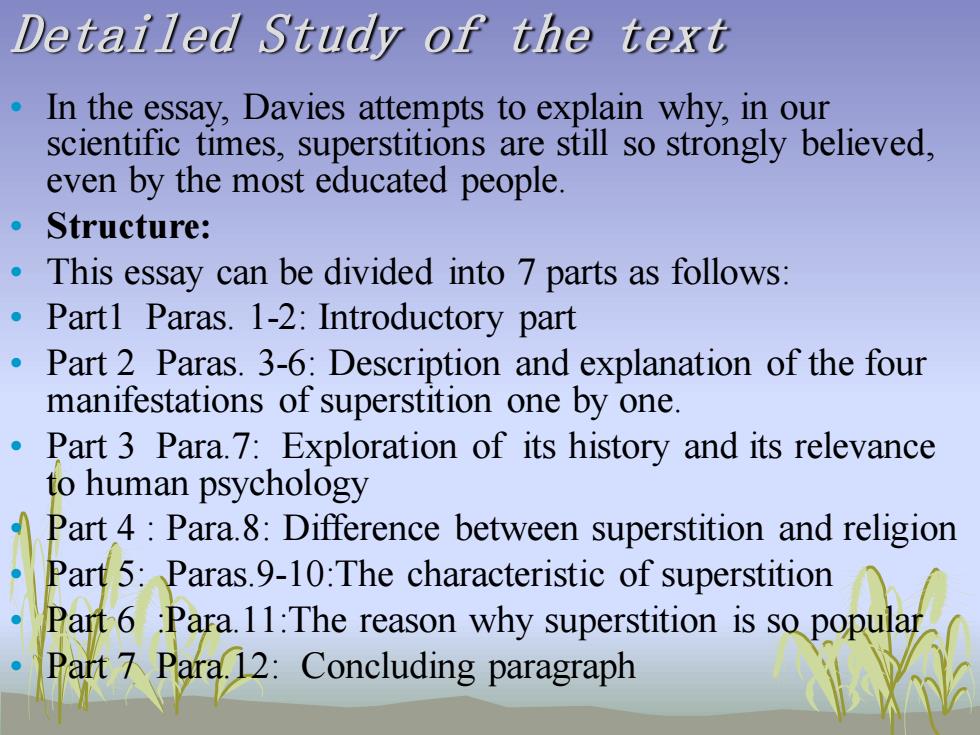
Detailed Study of the text In the essay,Davies attempts to explain why,in our scientific times,superstitions are still so strongly believed, even by the most educated people. 。Structure: This essay can be divided into 7 parts as follows: Part1 Paras.1-2:Introductory part Part 2 Paras.3-6:Description and explanation of the four manifestations of superstition one by one. Part 3 Para.7:Exploration of its history and its relevance to human psychology Part 4:Para.8:Difference between superstition and religion Part 5:Paras.9-10:The characteristic of superstition Part 6 Para.11:The reason why superstition is so popular Part 7 Para.12:Concluding paragraph
Detailed Study of the text • In the essay, Davies attempts to explain why, in our scientific times, superstitions are still so strongly believed, even by the most educated people. • Structure: • This essay can be divided into 7 parts as follows: • Part1 Paras. 1-2: Introductory part • Part 2 Paras. 3-6: Description and explanation of the four manifestations of superstition one by one. • Part 3 Para.7: Exploration of its history and its relevance to human psychology • Part 4 : Para.8: Difference between superstition and religion • Part 5: Paras.9-10:The characteristic of superstition • Part 6 :Para.11:The reason why superstition is so popular • Part 7 Para.12: Concluding paragraph
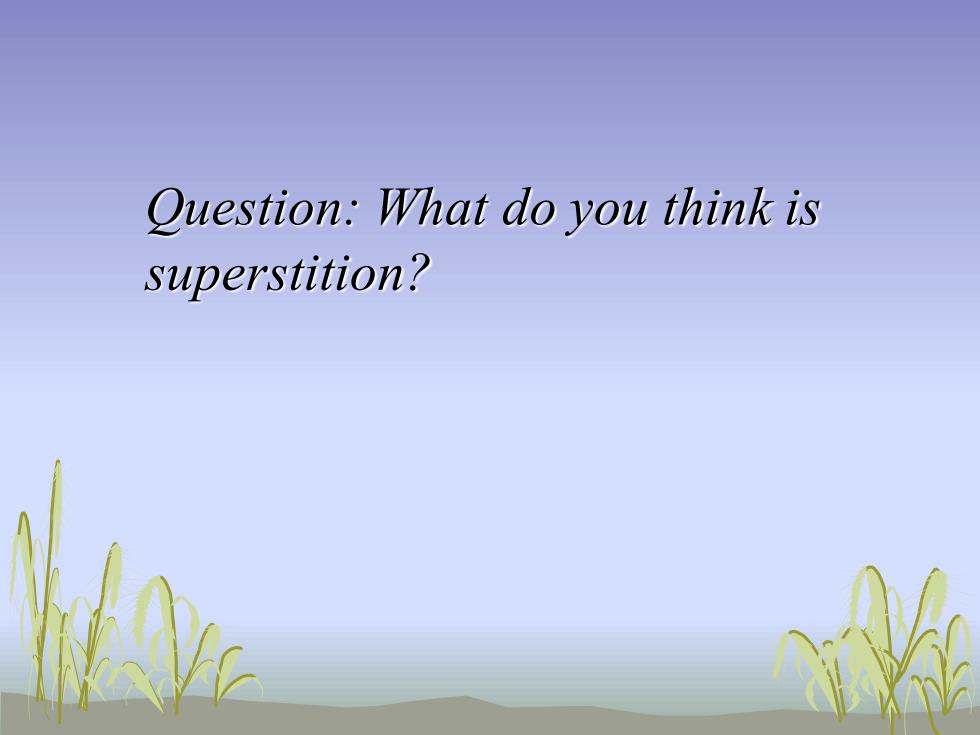
Question:What do you think is superstition?
Question: What do you think is superstition?
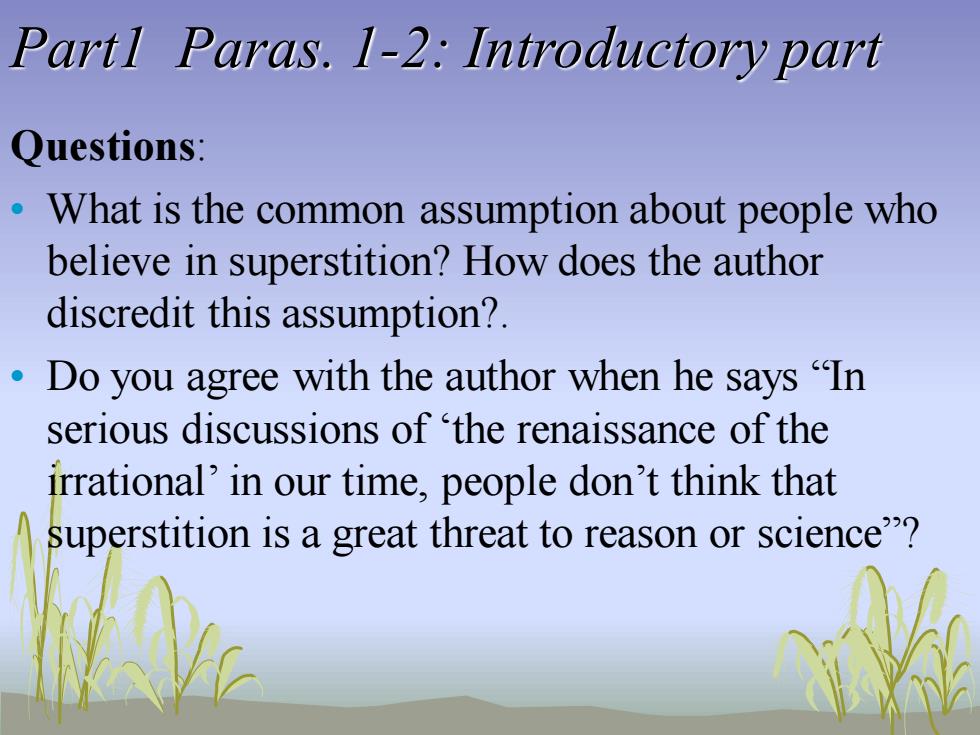
PartI Paras.1-2:Introductory part Questions: What is the common assumption about people who believe in superstition?How does the author discredit this assumption?. Do you agree with the author when he says "In serious discussions of the renaissance of the irrational'in our time,people don't think that superstition is a great threat to reason or science"?
Part1 Paras. 1-2: Introductory part Questions: • What is the common assumption about people who believe in superstition? How does the author discredit this assumption?. • Do you agree with the author when he says “In serious discussions of ‘the renaissance of the irrational’ in our time, people don’t think that superstition is a great threat to reason or science”?
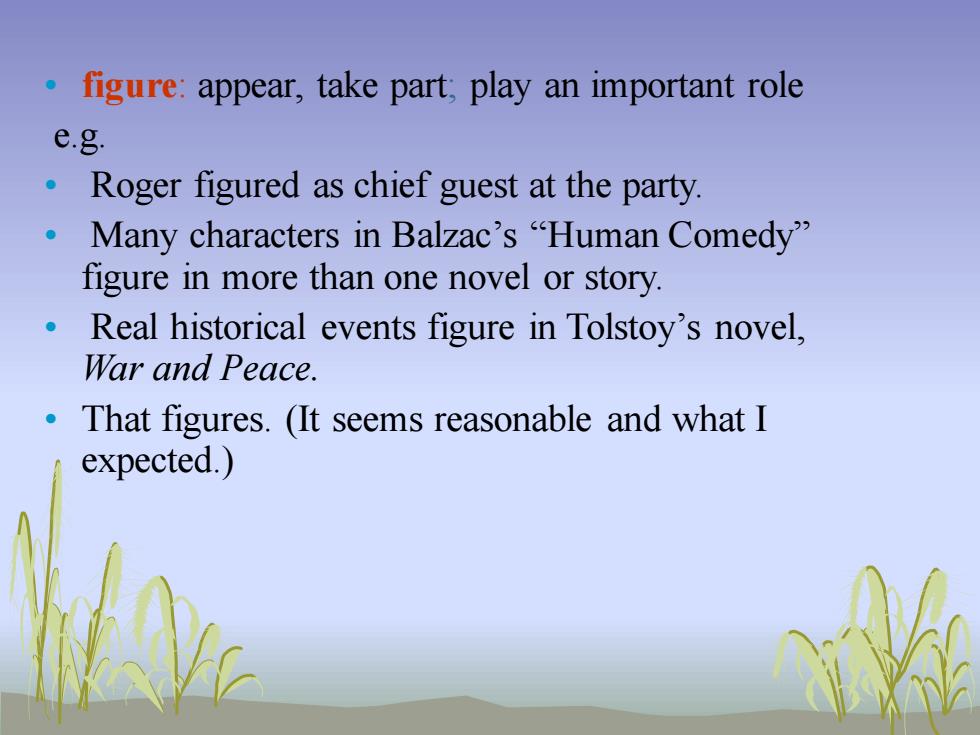
figure:appear,take part,play an important role e.g. 。 Roger figured as chief guest at the party. Many characters in Balzac's "Human Comedy" figure in more than one novel or story. Real historical events figure in Tolstoy's novel, War and Peace. That figures.(It seems reasonable and what I expected.)
• figure: appear, take part; play an important role e.g. • Roger figured as chief guest at the party. • Many characters in Balzac’s “Human Comedy” figure in more than one novel or story. • Real historical events figure in Tolstoy’s novel, War and Peace. • That figures. (It seems reasonable and what I expected.)
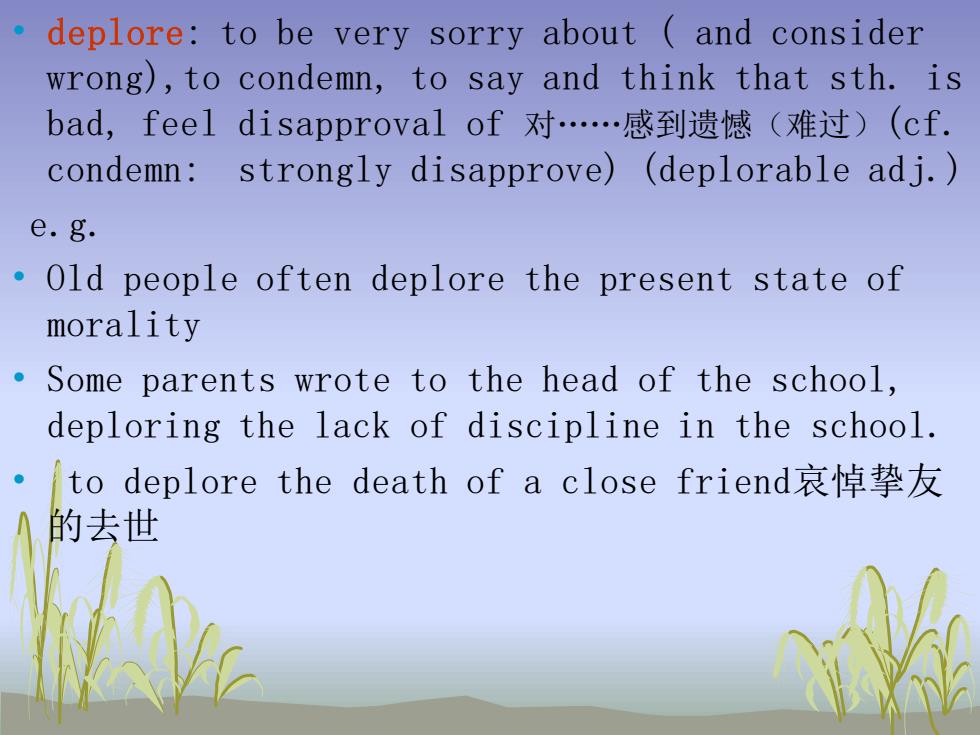
deplore:to be very sorry about and consider wrong),to condemn,to say and think that sth.is bad,feel disapproval of对.感到遗憾(难过)(cf. condemn: strongly disapprove)(deplorable adj. e.g. 0ld people often deplore the present state of morality Some parents wrote to the head of the school, deploring the lack of discipline in the school. to deplore the death of a close friend哀悼挚友 的去世
• deplore: to be very sorry about ( and consider wrong),to condemn, to say and think that sth. is bad, feel disapproval of 对.感到遗憾(难过)(cf. condemn: strongly disapprove) (deplorable adj.) e.g. • Old people often deplore the present state of morality • Some parents wrote to the head of the school, deploring the lack of discipline in the school. • to deplore the death of a close friend哀悼挚友 的去世
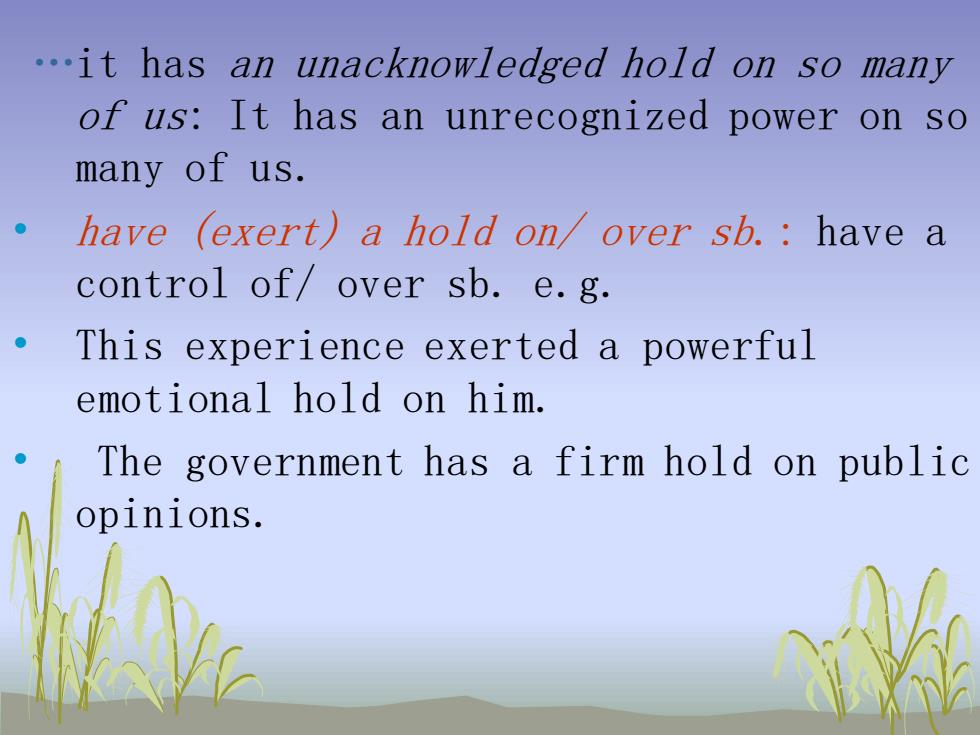
.it has an unacknowledged hold on so many of us:It has an unrecognized power on so many of us. have (exert)a hold on/over sb.:have a control of/over sb.e.g. ● This experience exerted a powerful emotional hold on him. The government has a firm hold on public opinions
.it has an unacknowledged hold on so many of us: It has an unrecognized power on so many of us. • have (exert) a hold on/ over sb.: have a control of/ over sb. e.g. • This experience exerted a powerful emotional hold on him. • The government has a firm hold on public opinions
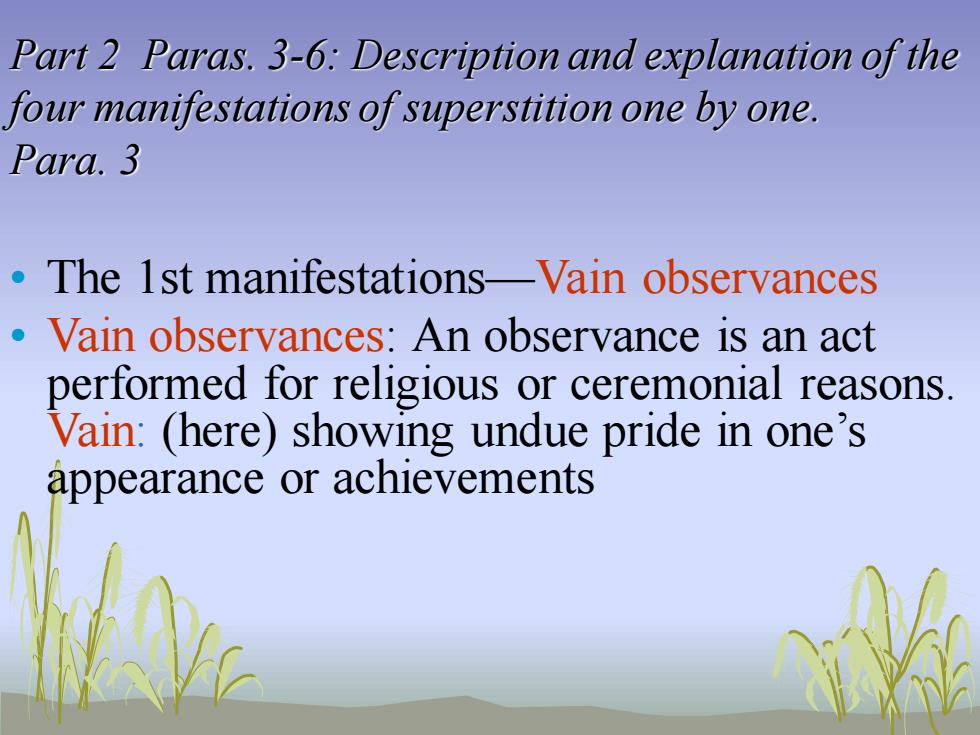
Part 2 Paras.3-6:Description and explanation of the four manifestations of superstition one by one. Para.3 The 1st manifestations-Vain observances Vain observances:An observance is an act performed for religious or ceremonial reasons. Vain:(here)showing undue pride in one's appearance or achievements
Part 2 Paras. 3-6: Description and explanation of the four manifestations of superstition one by one. Para. 3 • The 1st manifestations—Vain observances • Vain observances: An observance is an act performed for religious or ceremonial reasons. Vain: (here) showing undue pride in one’s appearance or achievements

Walk under a ladder:It has long been said that walking under a ladder brings bad luck.While many people have proven this old wives tale wrong,it's something that many people still avoid doing.This old wives tale is said to date back to early Christianity as the sides of the ladder and the ground form a triangle,the symbol of Holy Trinity.When one walks through it,it's said to violate the trinity,putting himself on the same level as the devil.(a different version from Notes
• Walk under a ladder: It has long been said that walking under a ladder brings bad luck. While many people have proven this old wives tale wrong, it’s something that many people still avoid doing. This old wives tale is said to date back to early Christianity as the sides of the ladder and the ground form a triangle, the symbol of Holy Trinity. When one walks through it, it’s said to violate the trinity, putting himself on the same level as the devil. (a different version from Notes 5)